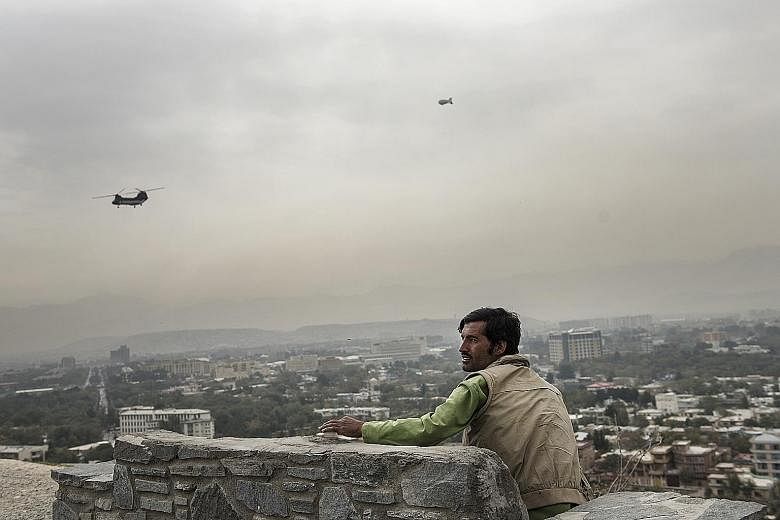KABUL • If there had been grumblings before about the deafening intrusion of low-flying US helicopters in the Afghan capital, the discontent has surely multiplied, along with the number of flights.
Packs of them now start flying at around 7am, then again at midday and at dusk.
Why so many?
"The American Embassy is not allowed to move by road anymore," a senior Western official said, speaking on condition of anonymity because he was not authorised to brief the news media.
"If you're at the airport and you have work at the embassy or at RS, they fly you over in the morning, and back at night," he said. RS refers to the international coalition's mission, which is known as Resolute Support.
After 14 years of war, it has become too dangerous to drive the 2.5km route from the airport to the embassy.
The helicopter transport is just one measure of how things have changed in the Afghan capital since last year, and the end of the huge Nato combat mission.
Restaurants and cafes have closed or have hardly any customers, news organisations have packed up, and the few Western-style hotels are nearly empty.
Just a few years ago, Kabul was having a boom like no other. After 2009, United States troop numbers surged, and US money washed over the country in greater measure than before. About US$715 billion (about S$1 trillion) has been spent since 2001, and much of that was in the past six years.
Until recently, Kabul had a vibrant night life. The many aid workers and security contractors, embassy staff and journalists had their pick of places to go, drink illicit alcohol, flirt and attend film screenings. There were French, Italian, Indian and Thai-style restaurants, and even a Japanese one - no raw fish, but lots of avocado and sushi rice.
Then, last year, an attack at one restaurant killed 21 people, 13 of them foreigners.
Now, Kabul feels like a beach resort during off-season, when the rides shut down. Only a handful of shops are still open, and those have few customers.
Most music funded by foreign donors has also stopped. The last performance sponsored by the French Cultural Institute, in the past the main centre for concerts of classical Afghan music, was attacked by a suicide bomber.
The detonation occurred in the middle of a musical and theatrical performance in December, killing one person and wounding more than a dozen, including the head of the Afghan National Institute of Music, Mr Ahmad Sarmast, who lost much of his hearing. His music school offered hope for poor but musically talented young Afghans.
It was not just the expatriates leaving; the Afghans were going, too, and in droves.
Once a sleepy outpost, a police station that doubles as the Interior Ministry's Office of Statistics and Registration was crowded with Afghans. Almost all of them were there to get their national identification card certified, a pre-requisite for acquiring or extending a passport, something many Afghans had not worried about before but were acutely aware of now as they consider leaving the country.
At the passport office, the lines started forming at 2am - men and women, shivering in the pre-dawn chill, huddling under blankets, waiting outside for as long as 10 hours to start the six- to eight-week process of getting the government's new passports.
The crowds at the passport office are one more sign of the worsening times, said Ms Hasina Safi, executive director of the Afghan Women's Network, a non-profit group that works on an array of human rights and gender issues.
Her relatives outside Afghanistan have been urging her to join them in the West. "But it will be very difficult if all the educated people leave," she said. "These are the people we need in this country; otherwise, who will help the ordinary people?"
NEW YORK TIMES

